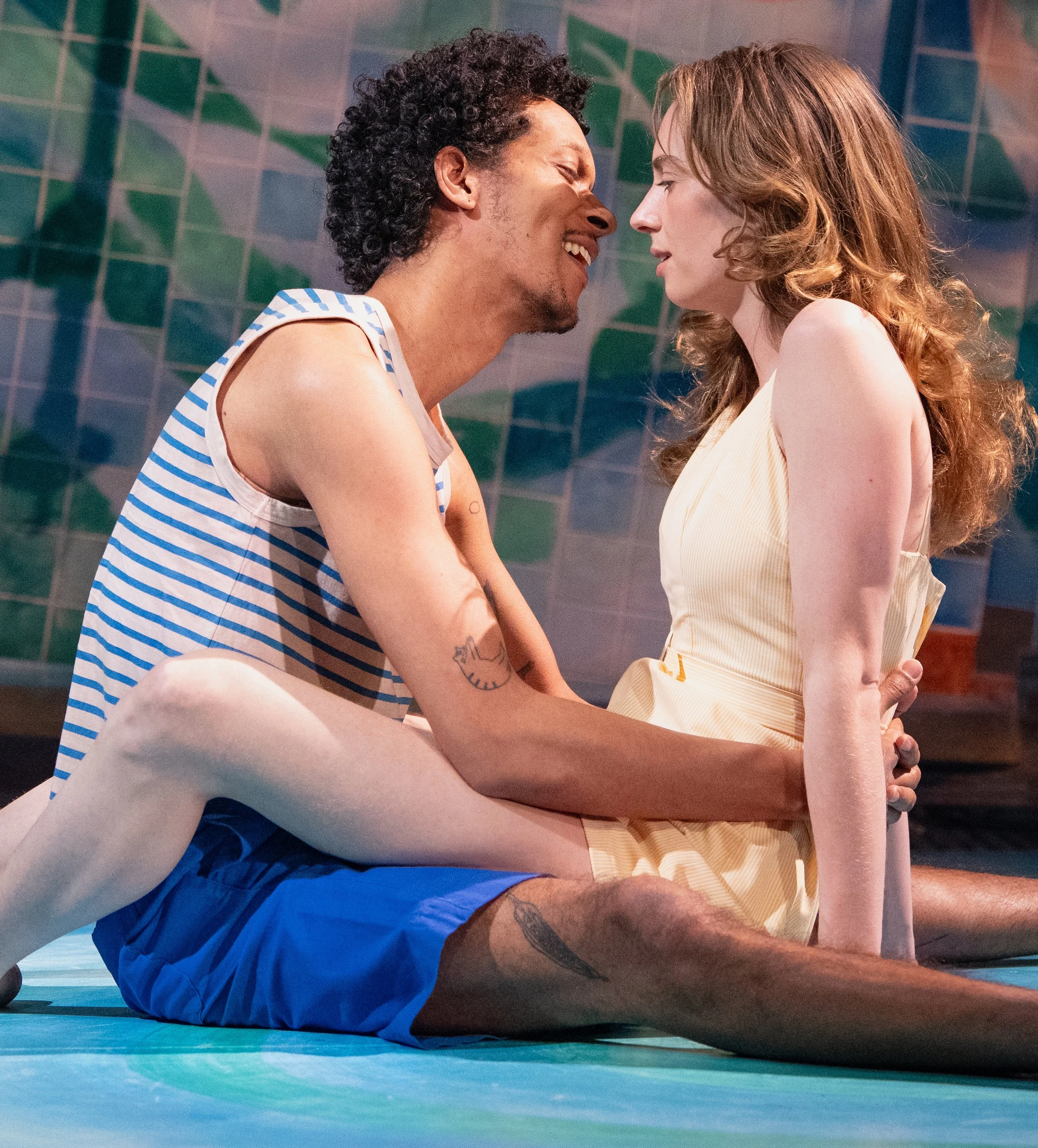Eurydice (Maya Hawke, right) in Hades with her sleeping father (Brian d’Arcy James) faces off with the Lord of the Underworld (T. Ryder Smith), in Sarah Ruhl’s reimagining of the myth of Orpheus and Eurydice.
Encountering adaptations of the myth of Orpheus and Eurydice seems as inevitable as Orpheus’s fateful turning around to look toward Eurydice on their journey out of Hades. Sarah Ruhl’s Eurydice, from 2003, is receiving a revival to conclude her Signature Theatre residency. The production is directed by Les Waters, who also helmed the play at Yale in 2006 and at Second Stage in 2007. Ruhl’s mournful and whimsical take emphasizes Eurydice’s life and point of view, hence the title excising “Orpheus and,” even bestowing its heroine with some agency, especially during that oh-so-famous moment of Orpheus looking back.
Orpheus (Caleb Eberhardt) and Eurydice become engaged to be married in the play’s opening scene.
This Orpheus and Eurydice, portrayed by Caleb Eberhardt and Maya Hawke, respectively, are supposed to seem very young and modern—in the script, Ruhl asks the actors to resist the classical temptation and to seem “a little too young and a little too in love.” The tone overall reaches for the lyrical, fantastical, and dreamlike—and it’s complemented by Scott Bradley’s scenic design of a floral tile set, all askew, achieving the Alice in Wonderland effect that Ruhl calls for in the script.
Eurydice is approached on her wedding day by A Nasty Interesting Man (T. Ryder Smith), lured to his apartment with the promise of a letter from her dead father, and then she dies in a fall while leaving the apartment in a hurry after rejecting Nasty Interesting Man’s lascivious advances.
Ruhl wrote the play in the wake of her father’s death, and the character of Eurydice’s father, here an excellent Brian d’Arcy James, is her invention. Father (as he is called in the script) is one of the only denizens of Hades to have retained his memory and his ability to read and write. He writes Eurydice letters, though has no means to send them to her: his unreceived letters adorn the towering backdrop, a powerful representation of the yearning to communicate with an out-of-reach loved one.
When Eurydice arrives in Hades, she has no memory, but her father patiently coaxes it back. He reads to her from King Lear, lowered into the underworld by Orpheus on a piece of string: “We two alone will sing like birds i’ the cage … / so we’ll live / And pray and sing.” Lear’s fantasy of life with Cordelia is achieved by Father and Eurydice, despite the occasional harassment by a chorus of three irritating stones (Maria Elena Ramirez, Jon Norman Schneider, and David Ryan Smith), dressed rather like Lear’s fool (costumes by Oana Botez) but hostile and petulant about any breaking of underworld rules. And that Nasty Interesting Man is now the Lord of the Underworld (Smith again, who manages to be both silly and menacing in these scenes). But he is just a child riding a tricycle, while at the same time he’s eyeing Eurydice for a wife.
In the underworld Eurydice at first has no memories, but her father builds her a room of string and patiently helps her to retrieve her memory. Photographs by HanJie Chow.
Given the successful reunion with her father, perhaps Eurydice doesn’t really want to return to Orpheus? Ruhl doesn’t portray the young lovers as perfect; in fact, Orpheus as written is a touch insufferable. The tragedy in Ruhl’s telling is not Eurydice’s decision to call out to Orpheus to get him to turn around (though this is very different than the usual unfolding of the myth, in which Orpheus looks back unprompted), but the forgetting that ensues: Father dips himself in Lethe (the River of Forgetfulness), and when Eurydice and then Orpheus die (in her case for the second time), their memories are also wiped away. All are together, but in oblivion.
At its best Ruhl’s dialogue is poetic, but it too often slides into the overly mannered and abstract, which can make the play feel bloodless or too self-consciously quirky. This is particularly apparent in the opening exchange between Orpheus and Eurydice, which evokes less a passionate love than a bohemian parody:
Eurydice: When are you going to play me the whole song?
Orpheus: When I get twelve instruments.
Eurydice: Where are you going to get twelve instruments?
Orpheus: I’m going to make each strand of your hair into an instrument. Your hair will stand on end as it plays my music and become a hair orchestra. It will fly you up into the sky.
Eurydice: I don’t know if I want to be an instrument.
And so on. Overall, however, the play is well served by a sterling production. Bradley’s scenic design (which also includes an elevator to Hades in which it pours rain), Reza Behjat’s haunting lighting design, and Bray Poor’s evocative sound design combine with Waters’s assured direction and strong performances to produce what is ultimately a moving, if uneven, meditation on grief and forgetting.
Sarah Ruhl’s Eurydice runs through June 22 at Signature Theatre (480 W. 42nd St.). Evening performances are Tuesday through Saturday at 7 p.m.; matinees are Wednesday, Saturday, and Sunday at 2 p.m. For tickets, visit signaturetheatre.org.
Playwright: Sarah Ruhl
Director: Les Waters
Scenic Design: Scott Bradley
Lighting Design: Reza Behjat
Costume Design: Oana Botez
Sound Design: Bray Poor





